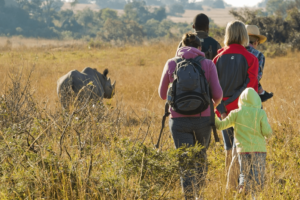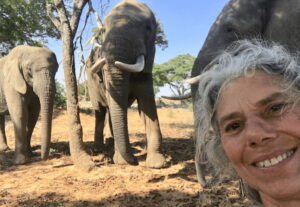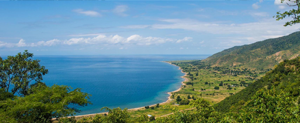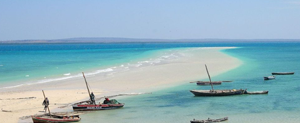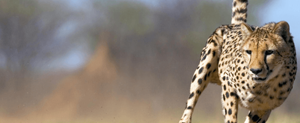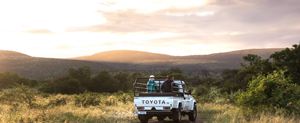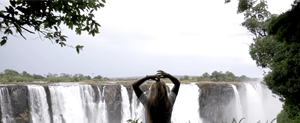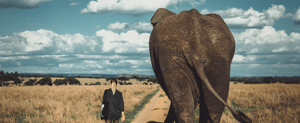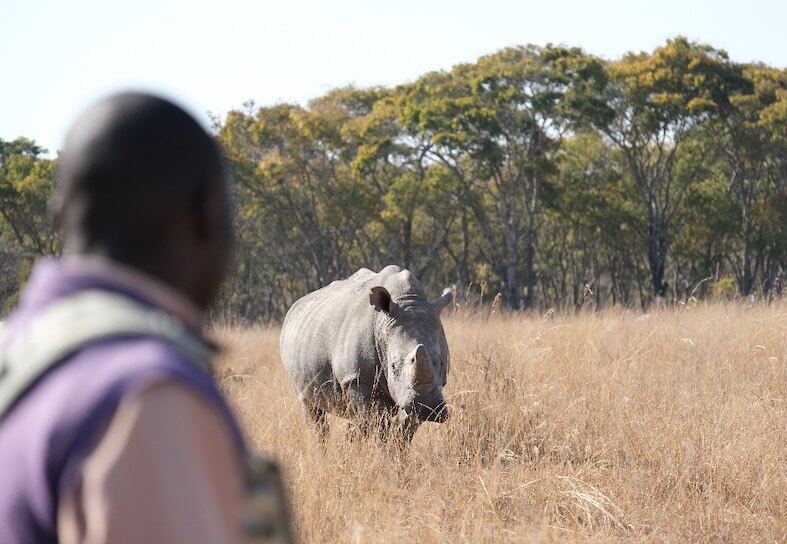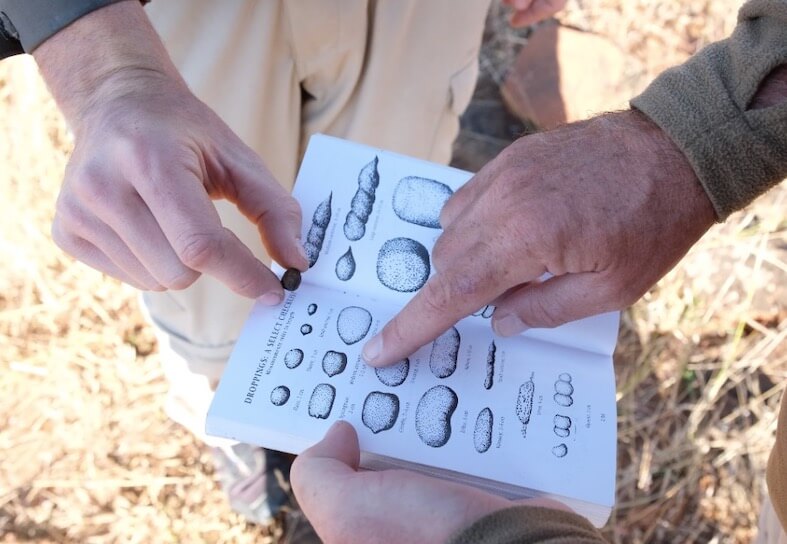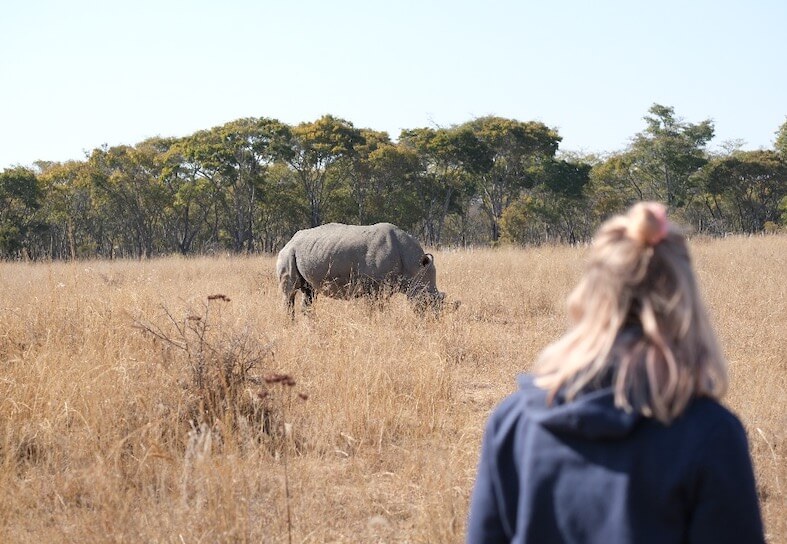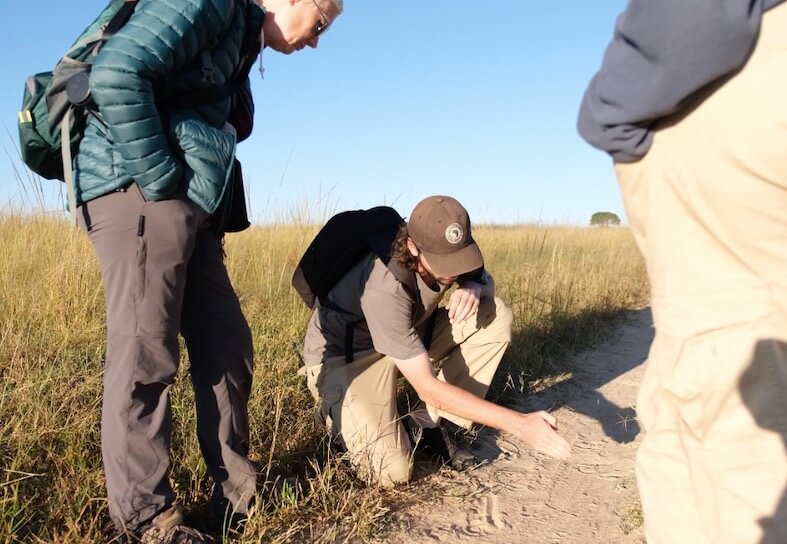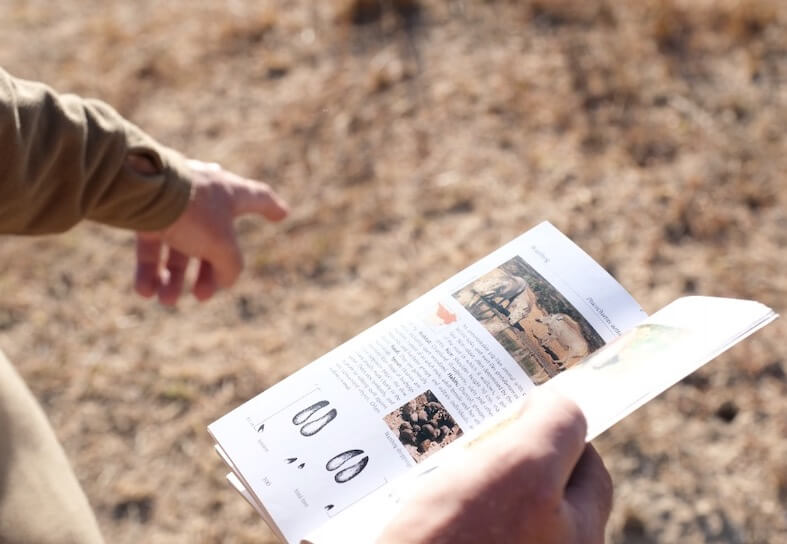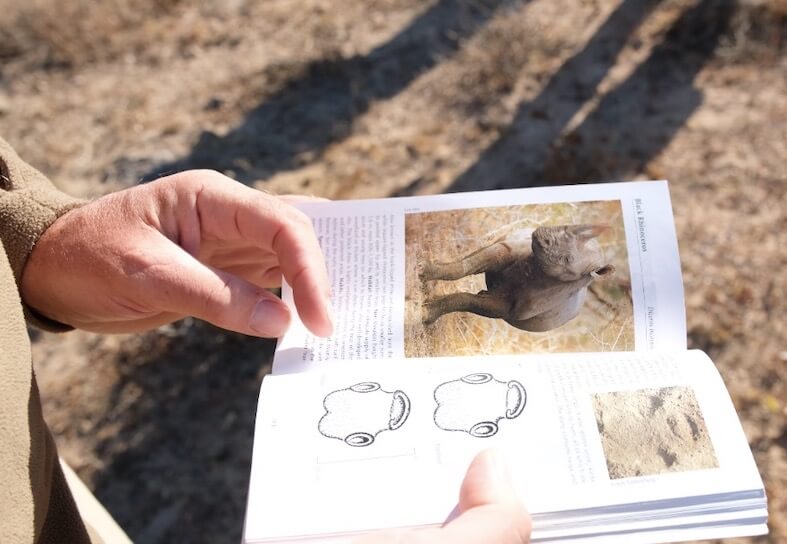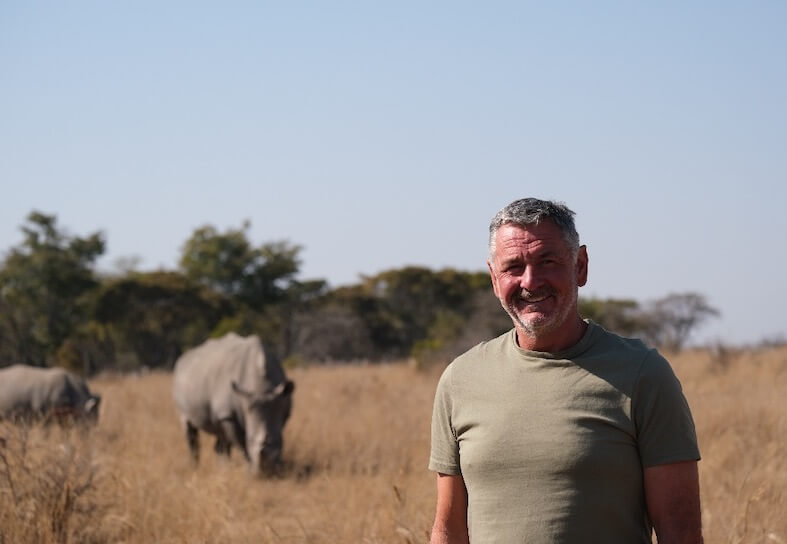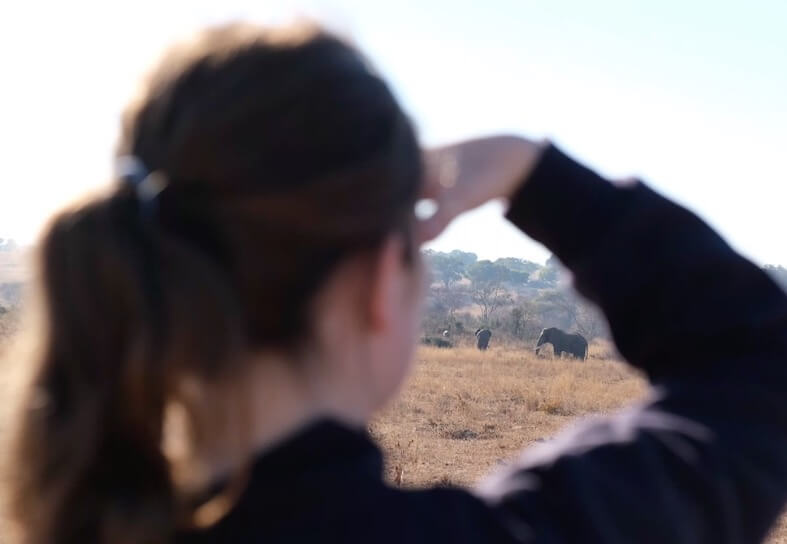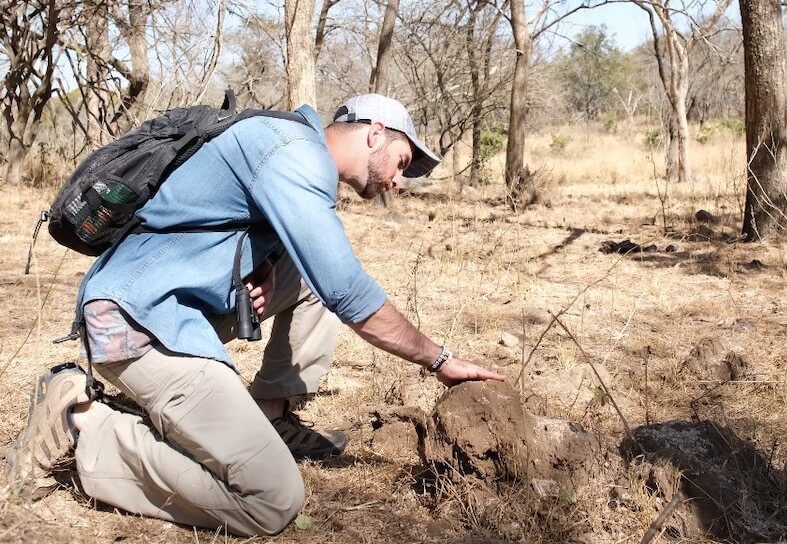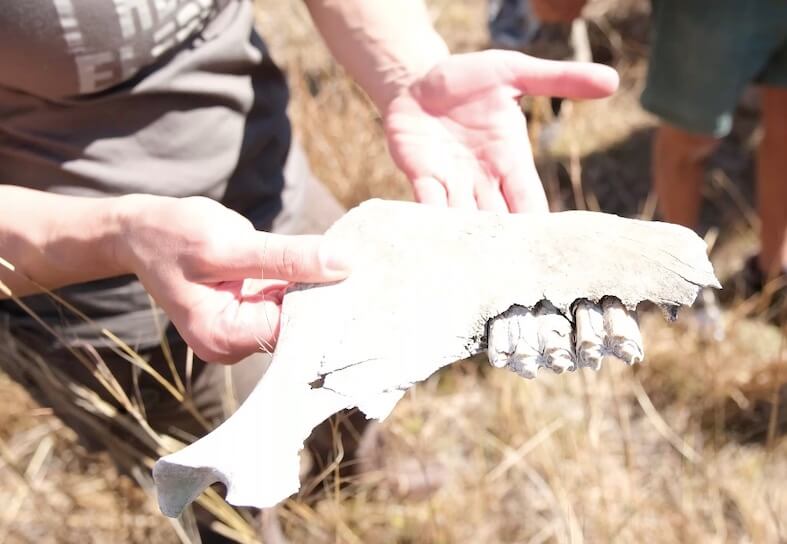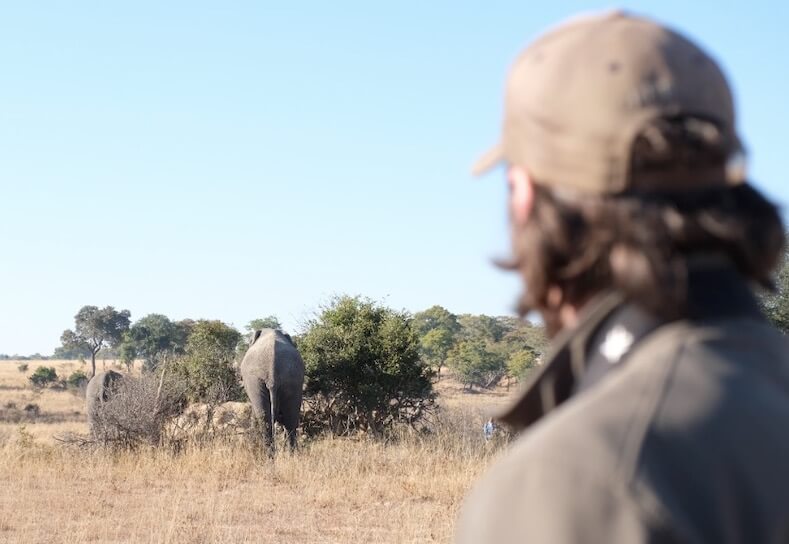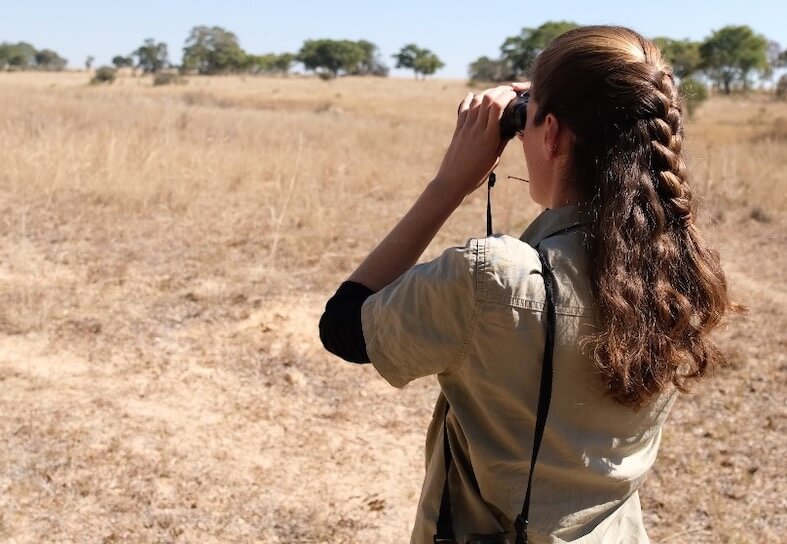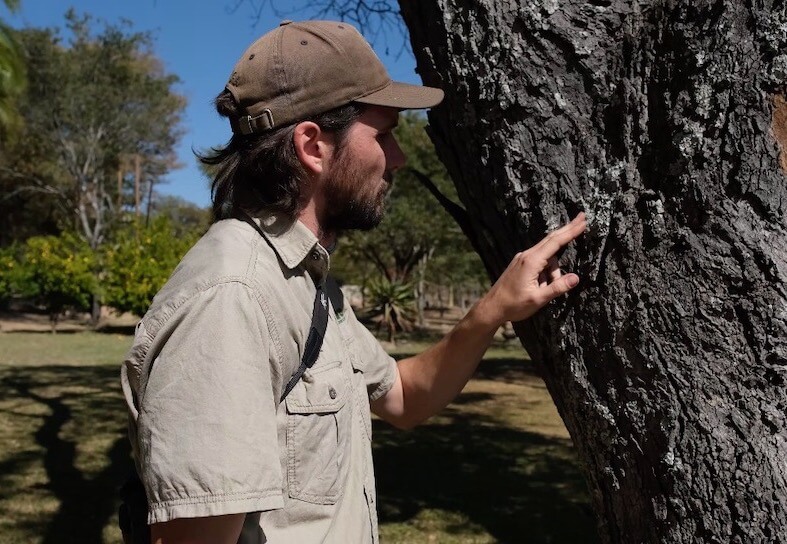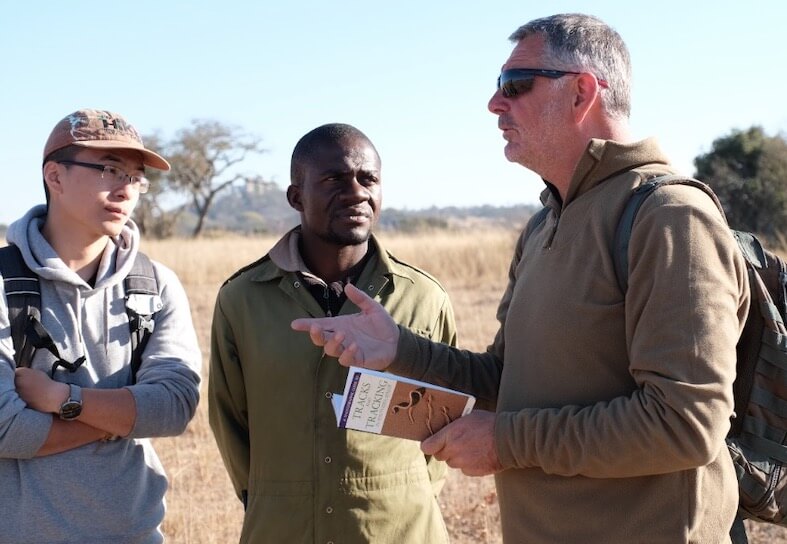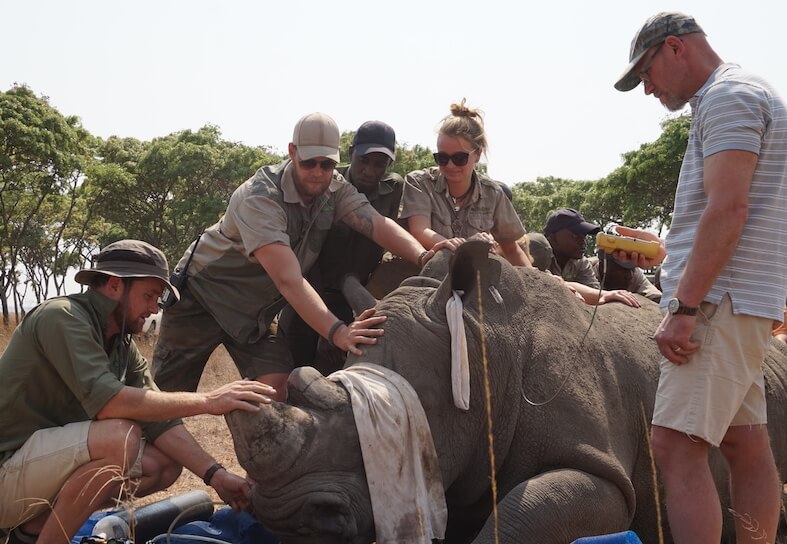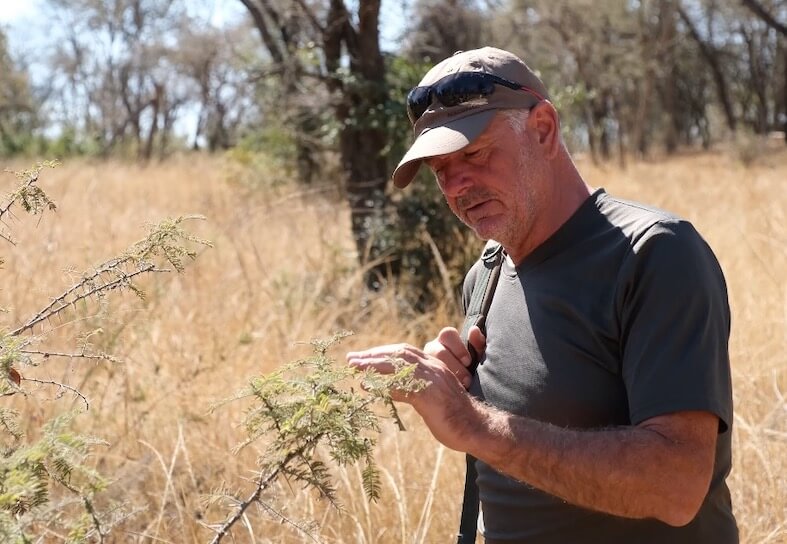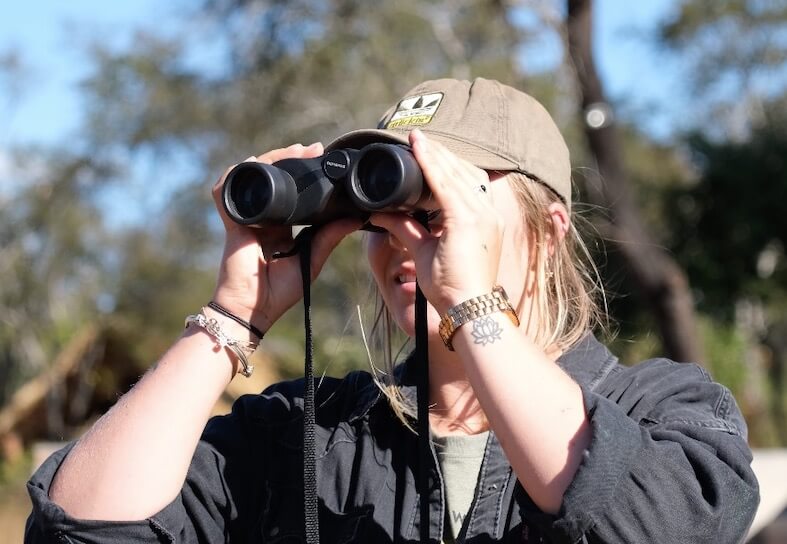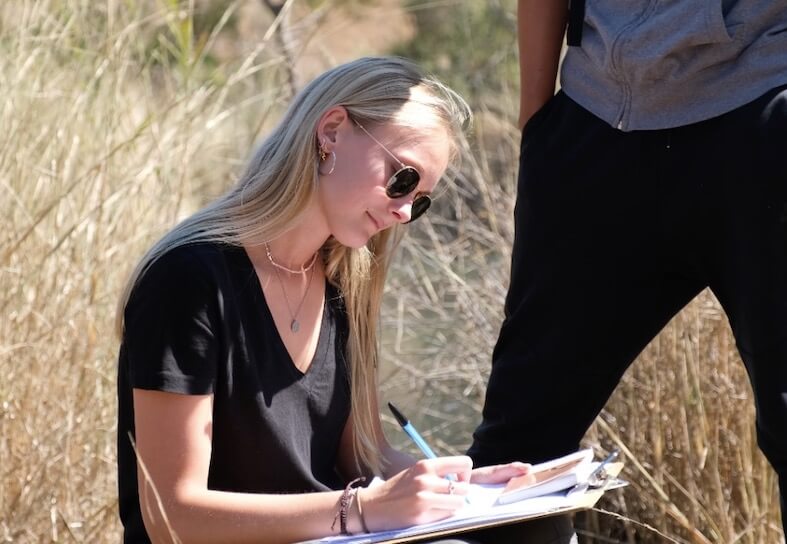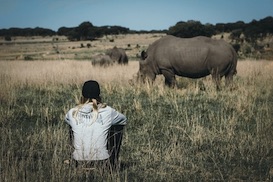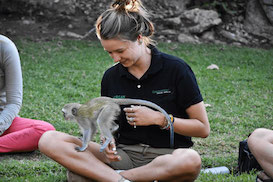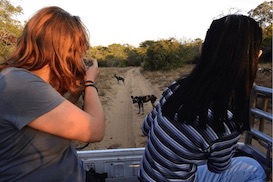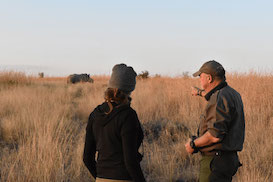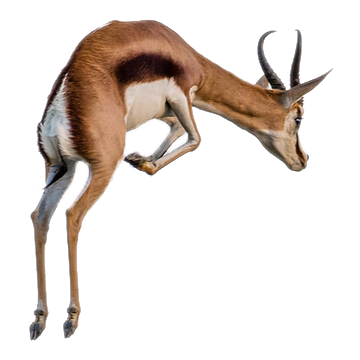Nature Enthusiast Wildlife Course
ZIMBABWE
Zimbabwe
6 weeks
Scheduled Mondays
Max 6 people
Age 18+
$4,995
Zimbabwe
6 weeks
Scheduled Mondays
Mondays
Max 6 people
Max 6
Age 18+
From $4,995
What's the course about?
Our Nature Enthusiast Wildlife Course is the perfect way to increase your knowledge of the natural world and immerse yourself in Africa’s diverse flora and fauna. Our FGASA-endorsed wildlife course takes you a step further than volunteering. It is perfect for people who want to have a more in-depth wildlife experience and learn more about the environment they are in. Six weeks in Zimbabwe will provide you with detailed practical and theoretical knowledge of the natural environment.
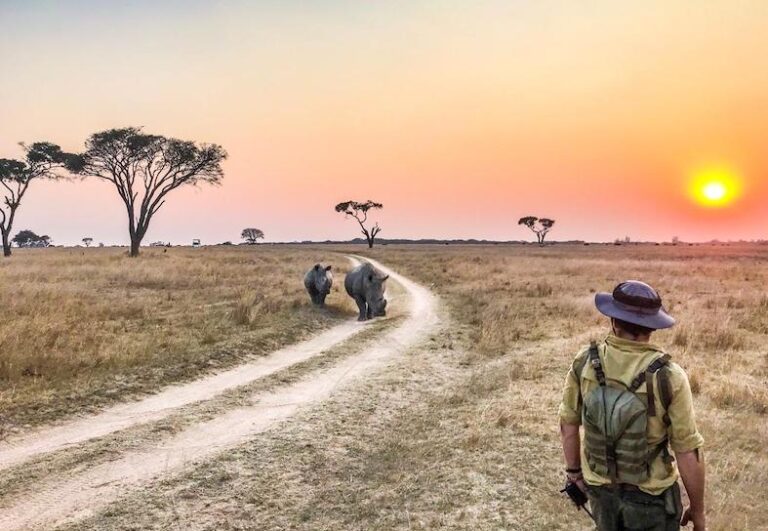
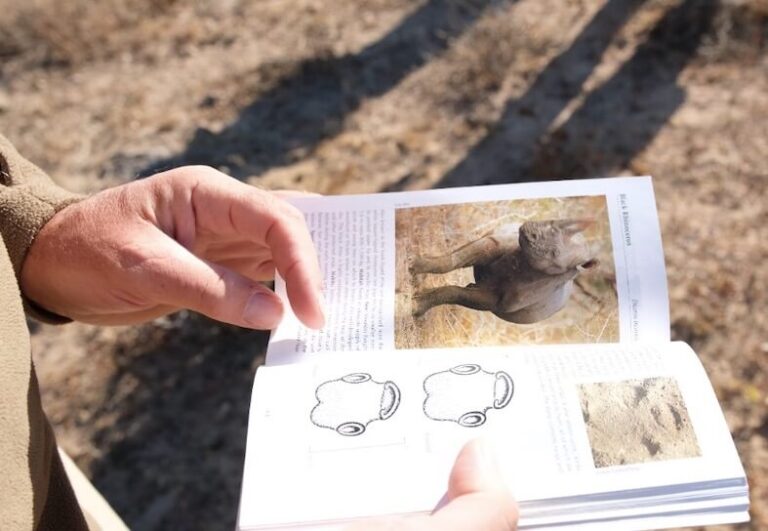
What will be covered?
Wildlife course students cover a wide range of topics and learn an immense amount about different environments, ecology and habitats. You will learn to identify large and small mammals, track wildlife and interpret signs, and understand animal and bird behaviours. The wildlife course also teaches practical skills in bush survival and orienteering, and you will be exposed to current conservation techniques and challenges.
What makes this wildlife course unique?
Our Nature Enthusiast Wildlife Course is based on a family-run conservancy in Zimbabwe, home to ten black and eight white rhinos, three elephants, a range of other large and small animals, and more than 150 bird species. Students will manage wildlife research projects which contribute to long-term conservancy management and learn practical field research and data-gathering techniques, which can be applied across many conservation and wildlife careers.
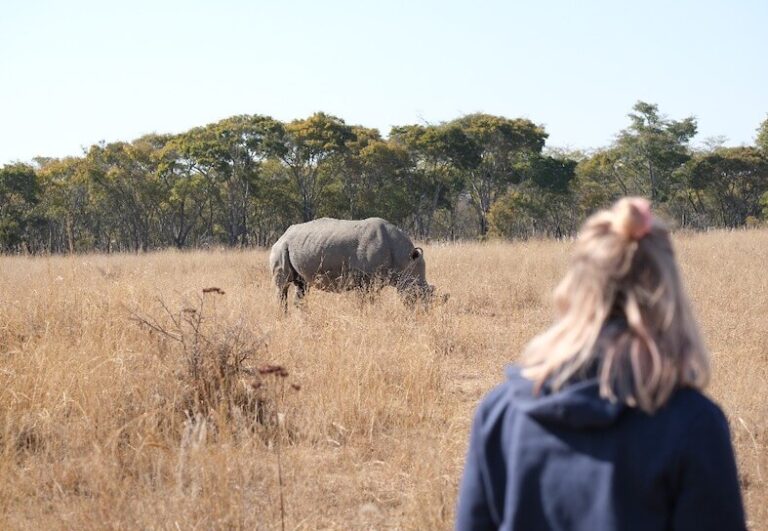
Project showreel
Project gallery
Project information
The 6-week Nature Enthusiast Wildlife Course is an extension to the project’s popular and successful Rhino & Elephant Conservation Programme.
Our FGASA-endorsed Nature Enthusiast Wildlife Course is the perfect way to increase your knowledge and appreciation of the natural world, while enjoying the very best of what Imire has to offer. The broad range of wildlife topics covered, the experienced course leaders and the research techniques you will learn, are what set the this Nature Course apart from the rest.
Over the 42 day course, you will cover a huge range of topics and learn an immense amount about Imire’s different environments, ecology and habitats. You will learn how to identify large and small animals, track wildlife, interpret signs and understand mammal and bird behaviours. You will also be shown the basics of bush survival and orienteering and learn from experts about current conservation techniques and the challenges surrounding wildlife conservation in Zimbabwe.
You will learn to apply your skills in a range of environments, and will gain the theoretical skills that ensure you can apply what you have learnt across a variety of wildlife and conservation industries, anywhere in the world.
During 6 week wildlife course you will study the following subjects:
- Astronomy
- Geology
- Weather and climate
- Ecology
- Taxonomy
- Botany – wild flowers, trees and grasses
- Arthropods (insects)
- Amphibians
- Reptiles
- Fish
- Birds
- Mammals
- Animal behaviour
- Conservation management
- Historical human habitation
- Tracking skills
Custom modules:
- Introduction to Zimbabwe and Imire
- Bush survival skills
- Basic weapons handling
- Scientific studies and research including grass surveys, telemetry tracking, camera traps, fish and amphibian surveys
Scientific Research
There is no other wildlife course which facilitates meaningful research quite like ours, where participants actively contribute to Imire’s scientific research projects.
Each topic of study includes a wildlife research project. For example – if you’re studying mammals you may go out into the reserve and track the rhinos using telemetry. Over time the data will then be mapped revealing ‘rhino hot spots’. This will allow better deployment of anti-poaching resources and better management of the vegetation on which the rhinos rely.
Another example – if you’re studying birds there is a bird ringing scheme. This involves catching birds using a mist net and applying a specially designed ring. Each ring is unique to that particular bird so if it’s caught or photographed again you can ID individuals. This allows the conservancy to better understand movements and migrations, monitor particular species, measure breeding success, understand population declines and ultimately conserve Zimbabwe’s bird species.
Whether you’re thinking about a career in conservation or simply want to learn more, being involved in research projects will give you invaluable experience.
The Nature Enthusiast programme is small and welcoming, with no more than 6 students in a group.
Your home away from home is the Wilderness Camp, a beautiful camp situated in the wild side of the reserve near a large dam, which allows an intensive learning in a diverse ecosystem. The camp is in an idyllic spot with large walk-in tents, a main bar, lounge, outside pool and braai area – all surrounded by pristine African bush.
You will sleep in a twin, en-suite safari-tent with the most beautiful landscape in the whole reserve. Bedrooms are shared (same sex sharing), with students sleeping in comfortable single beds. All bedding is provided, including duvets, pillows and extra blankets in winter. Couples will always be accommodated together in a private room. Showers and toilet facilities are en-suite in each tent, and hot water is supplied for showers and washing. Power sockets for electrical items are available in communal areas (UK three-pin square plugs).
Three home cooked meals are provided each day on a self-serve basis. Vegetarian and vegan options are available upon request. The project are able to cater for specific dietary needs (for example gluten, dairy or wheat intolerance), but you may be asked to bring any specialist foods with you. The chefs will be able to prepare these for you alongside other volunteer’s standard meals. Clean, safe drinking water is pumped from a borehole.
Your rooms and communal areas will be cleaned every day, and the housekeeping staff will also do your laundry when required. An outhouse laundry is available for washing smalls or should you wish to do an extra load of your own.
Bear in mind that electricity can be intermittent in Africa, especially during our rainy season. For backup, the project are prepared with basic solar powered lighting and a generator which will run for a short time in the morning and evening.
There is pay as you go Wi-Fi at the project. When there is no electricity, the cellphone signal can be problematic, but it is available to touch base with home in certain areas of the conservancy.
There is access to a safe for securely locking away any cash or valuables you may have brought with you.
[gallery size=”medium” ids=”5201,4517,5366,4518,4515
Course dates
22nd January – 4th March 2024 – **SPECIAL OFFER! This course is offered with a 15% discount, bringing the fees down to $4,245**
15th April – 27th May 2024
9th September – 21st October 2024
Course pricing:
6 week course: $4,995
All prices are in USD.
What’s included in the cost?
- Accommodation and three meals per day, plus unlimited water, juice, tea and coffee
- Return airport transfers (on project start and end dates)
- Laundry and housekeeping
- All training costs, Nature Enthusiast workbook and course manual
- Transfers between course locations
- Practical instruction by experienced guides
- Equipment and materials required to do your work
- Full orientation upon arrival
What’s not included?
- Flights or travel to Harare, Zimbabwe
- Visa fees (variable depending on nationality)
- Travel insurance (compulsory)
- Personal expenses such as souvenirs, drinks from the bar, snacks
- Pre and / or post programme accommodation (if required)
- Additional excursions
- Local SIM card and data / airtime bundles (optional)
- Administration fee ($40)
View our booking terms and conditions.
The primary goal of Imire is to support Zimbabwe’s rhino heritage, through the successful breeding and re-introduction of the endangered black rhino. Alongside this goal, is to ensure the long term protection of Zimbabwe’s wildlife through a unified and holistic approach to wildlife conservation. Their aim is to create a blueprint for small conservancies, enabling them to peacefully and successfully exist alongside local communities, ensuring that environmental stakeholders, including landowners, conservationists, communities and local farmers, all benefit from the presence of wildlife.
The Nature Enthusiast Course forms a critical part of Imire’s mission to give wildlife-lovers the opportunity to learn more about Africa’s wildlife, whilst contributing to a sustainable, long term conservation strategy. Participants on the course, led by experienced instructors, will pioneer Imire’s scientific research, which contributes to the long-term management of the conservancy.
During your time on the Nature Enthusiast Course, alongside a deep understanding of animal behaviour, you will gain an appreciation of the dedication and commitment it takes to protect wildlife in Africa, and obtain an overall understanding of holistic conservation strategies and ethical conservation practices.
The course is perfect for:
- Nature lovers
- Volunteers
- Researchers
- Graduate and post-graduate natural science students
- Career break travel
- Mature travellers
- Gap year travel
Imire: Rhino & Wildlife Conservation is a 10,000 hectare privately owned rhino conservancy in the Mashonaland East district of Zimbabwe, approximately 130km east of Harare. The conservancy is dedicated to the welfare of all wildlife, with a particular focus on the protection and breeding of white rhino, and the critically endangered black rhino.
Imire was founded in 1948 by Norman and Gilly Travers. Originally farmers, the Travers’ had a passion for wildlife and conservation, leading to the establishment of Imire as a wildlife conservancy in 1972. During the 1970s, game was introduced back onto what was previously farmland. Then, like Noah’s Ark, the animals came in two by two and by 1980 the park was home to sizeable herds of plains game – waterbuck, impala, nyala, zebra and the rare sable antelope.
A history of rhino conservation
During the poaching crisis of the 1980s, most of Zimbabwe’s remaining black rhino population were relocated to the relative safety of Intensive Protection Zones within private conservancies. In 1987, Imire was granted custodianship of seven orphaned calves from the Zambezi Valley and became a dedicated black rhino breeding station. To date, 15 rhino have been born on the reserve, and Imire has released 13 black rhino back into National Parks in Zimbabwe.
With increasingly sophisticated wildlife poaching, rhino numbers have again dropped alarmingly. Until the current high levels of poaching abate in Zimbabwe’s National Parks, Imire has resolved to protect and secure its rhino onsite, rather than risking release into wilderness areas.
Imire’s current strategy is for their rhino, excepting a core breeding herd, to be released into a community-supported, second stage, free-roaming wilderness area within Imire’s boundaries. This allows the rhino to become less habituated, without daily interactions and supplement feeding. Armed guards remain with the rhino, but at a distance. In this way Imire can ensure their rhinos are safe from birth, until such a time when they are able to confidently release rhino back into their wild habitats, in Zimbabwe’s National Parks.
Other wildlife
Imire is world-world-famous for its ten black and eight white rhino. In addition, the conservancy is home to three elephants, a herd of Cape buffalo and an elderly male lion, living out his retirement in comfort! There is a variety of plains game including eland, kudu, nyala, waterbuck, blesbok, zebra, giraffe, wildebeest and crocodile, plus herds of the rare sable antelope – Zimbabwe’s National Animal. Imire is also home to a wide variety of birds, reptiles and snakes.
Who should join the course?
No previous experienced or education is required, but a passion for nature is essential. The course is a wonderful learning experience for participants of all ages and backgrounds, who would like a more in-depth experience and understanding of Africa’s iconic and endangered wildlife.
There is some walking and foot-based tracking on the project, plus climbing in and out of a high-sided vehicle, so volunteers should be of reasonable mobility. You will need to have a good grasp of spoken and written English.
How old do I need to be?
The minimum age for solo travellers is 17 years. There is no upper age limit, but for students aged over 65, we do require your medical form to be signed by a doctor.
How many people will there be?
There is a maximum of 6 participants at one time, plus staff.
When can I join?
You should aim to arrive and depart on the Monday start and end dates of the course. The inclusive transfer service is as follows:
Arrivals – Mondays
There is one collection from Harare International Airport at 1300 on the Monday afternoon. Should your preferred flight arrive later than this, you can either arrive into Harare on the Sunday and arrange overnight accommodation in town, or you can arrive on the Monday and pay a transfer supplement of $100. If you choose to arrive on Sunday, you should make your way to the airport at an agreed time on Monday.
Departures – Mondays
There is one transfer from Imire which arrives at Harare International Airport at 1000 on Monday morning. Onward flights should depart later than midday to allow ample time to check in. Should you wish to book a departure transfer outside of this time, there is a transfer supplement charge of $100.
What will the weather be like?
April – October is the dry season, with the rains usually coming in mid to late November. June – September is winter, characterised by warm, sunny days, clear blue skies and cool evenings and nights. October is the hottest month, with temperatures in the area reaching 30-32 degrees. November – March is summer, where rain showers are intermingled with hot, sunny days and temperatures of over 30 degrees.
How long is the course?
The course is six weeks long. You are welcome to stay longer at the project and join either the Rhino & Elephant Conservation Programme or the Horse Riding & Rhino Conservation Programme.
What reference books should I read or bring?
You will be issued with a course manual and workbook, but you will also need the following reference reference books (or the apps associated with the book):
- Roberts Birds of Southern Africa – Gibbon and Voelker
- Mammals of Southern Africa – Smithers
- Field Guide to Trees of Southern Africa – Van Wyk and Van Wyk
- A Photographic Guide of Tracks and Tracking in Southern Africa – Liebenberg
How much spending money should I bring?
We recommend bringing around $75 per week in USD to cover personal expenses such as drinks, souvenirs, t-shirt, snacks, tips and internet usage.
Do I need a visa?
Most nationalities, including British, American, Canadian, Australian and most EU citizens, can get a 30-day tourist visa upon arrival into Harare. Fees are dependent on nationality and range from $30 – $75 (paid in USD cash). Extensions are available from the Department of Immigration in Harare, up to a maximum stay of 6 months. The project will assist in renewing your visa after 30 days.
It is your responsibility to check your visa eligibility prior to arrival.
What animals will I encounter?
Imire is world-world-famous for its ten black and eight white rhino. In addition, the conservancy is home to three elephants, a herd of Cape buffalo and an elderly male lion, living out his retirement in comfort! There is a variety of plains game including eland, kudu, nyala, waterbuck, blesbok, zebra, giraffe, wildebeest and crocodile, plus herds of the rare sable antelope – Zimbabwe’s National Animal. Imire is also home to a wide variety of birds, reptiles and snakes.
What vaccinations do I need?
Please consult your GP or travel clinic for detailed medical advice. All volunteers should make sure their Tetanus vaccination is up to date.
Malaria – the project is regarded as a low-risk malaria area, but please consult your GP for guidance.
Please visit this UK government website for more details.
Other projects you might be interested in
Join a unique wildlife conservation project, dedicated to the protection of Zimbabwe’s rhino. Play a vital role in securing the future of these iconic animals.
From $950
1 - 12 weeks
Volunteer at Zimbabwe’s only dedicated primate rehabilitation centre. Gain animal care experience and assist in wildlife rehabilitation and release.
From $870
1 - 12 weeks
Support conservation work to protect endangered species in South Africa. Monitor priority species including lion, leopard, cheetah, rhino and wild dog.
From $1,450
2 - 16 weeks
Gain practical experience in advanced anti-poaching techniques, learning from South Africa’s most experienced conservation professionals.

